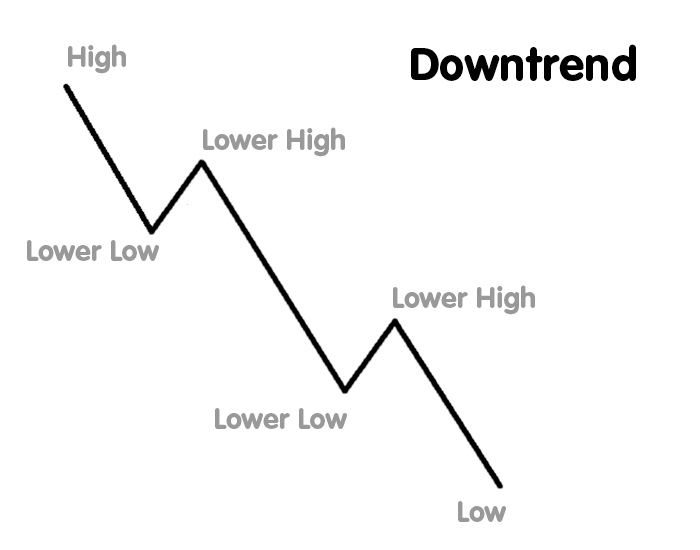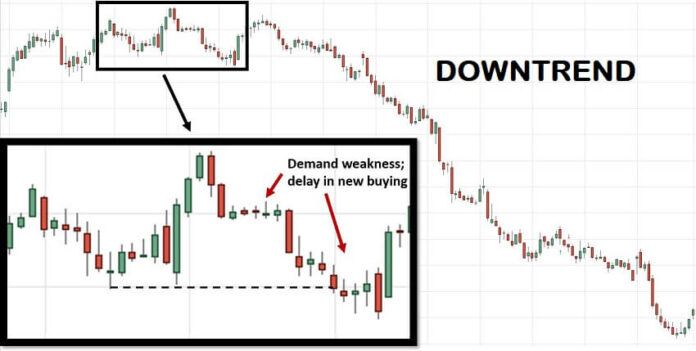A downtrend is an overall move lower in price, created by lowers lows and lower highs.
A downtrend describes the price movement of a financial asset when the overall direction is downward.
In a downtrend, each successive peak and trough is lower than the ones found earlier in the trend.
The downtrend is therefore composed of lower swing lows and lower swing highs.
As long as the price is making these lower swing lows and lower swing highs, the downtrend is considered intact.
Once the price starts making higher swing highs or higher swing lows, the downtrend is in question or has reversed into an uptrend.

Lower Peaks and Troughs
Lower peaks and troughs characterize downtrends with lower lows and lower highs taking place.
A peak refers to the highest point. A trough is the lower point.
A downtrend is characterized by the chart’s peaks and troughs reaching new lows as the trend progresses.
So, if you look at the chart over time, it may be zigzagging, but it’s generally going down.
How to Trade a Downtrend
Traditionally, the way to spot a downtrend is to look for lower lows, as well as lower highs.
That’s because there are too many sellers and too little demand, so the price goes down.
The highs are also lower because sellers are motivated to get rid of their position, and there aren’t enough buyers to step in and replace them.
Traders utilize trend lines to identify a downtrend and spot possible trend reversals.
The trend line is drawn along the falling swing highs, which helps show where future swing highs may form.
A downtrend is when price action is moving lower over a period of time and is most recognizable by prices creating lower lows and lower highs.
A downtrend provides traders with an opportunity to profit from falling asset prices.
Buying an asset once it has failed to create a lower peak and trough is one of the most effective ways to avoid large losses that can result from a change in trend.
The price should be making lower swing lows and lower swing highs to confirm that a downtrend is present.
When an asset fails to produce lower swing highs and lows, it means that an uptrend could be underway, the asset is ranging, or the price action is choppy and the trend direction is hard to determine.
In such cases, traders may opt to step aside until a downtrend is clearly visible
Trading Tips
- Look for prices to reach previous highs but are not able to break through. This is a good indication that buyers are no longer buying and we could be setting up for a move lower.
- Use previous highs as a stop location
- Look for a break in previous lows to confirm the downtrend
- Profits should be taken as prices flush below previous lows and stops should be adjusted to the last previous high.
- Trends are temporary. Even if they are strong or have a potential for making profits, never risk too much on any one trade.
If you liked this article, then please subscribe to our Newsletter Services for Forex Related updates. You can also find us on Facebook and can subscribe to our YouTube channel. You can also join our Telegram Channel for real-time trading analysis and discussion. Here is our service sitemap. If you have any confusion please leave your comments below.




























